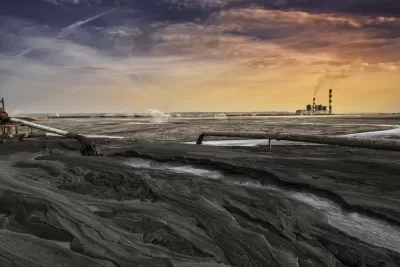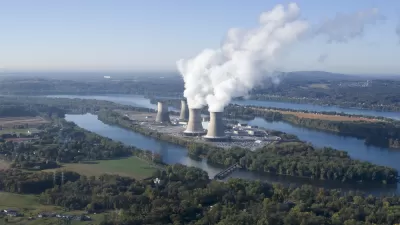The president hopes to revitalize the nation's sagging coal industry by forcing utilities to purchase power from aging coal and nuclear power plants in the name of national defense. The news is already paying dividends for coal companies.

Jennifer A. Dlouhy, an energy reporter for Bloomberg News, describes a directive from President Donald to Department of Energy Secretary Rick Perry to order grid operators to purchase electricity from coal and nuclear power plants that may be uncompetitive with newer plants burning natural gas and using renewable energy.
The department’s strategy, outlined in a memo [dated May 29] obtained by Bloomberg News, would use authority granted under a pair of federal laws to establish a “strategic electric generation reserve” and compel grid operators to buy electricity from at-risk plants. The steps are necessary, the memo says, to protect national security.
The memo's contents were essentially confirmed by White House spokeswoman Sarah Sanders in a June 1 emailed statement:
“Impending retirements of fuel-secure power facilities are leading to a rapid depletion of a critical part of our nation’s energy mix and impacting the resilience of our power grid." Trump has directed Perry “to prepare immediate steps to stop the loss of these resources and looks forward to his recommendations.”
The plants are considered “fuel-secure” because they house coal and nuclear material on site and are not dependent on pipelines that can be disrupted, wind that stops blowing or a sun that sets.
The news is already having a positive effect on the coal industry, shown by rising stock prices for Peabody Energy Corp, Arch Coal Inc. and Consol Energy Inc.
Under the Energy Department’s draft plan, the administration would take action under two laws: the Federal Power Act that allows the government to guarantee profits for power plants amid grid emergencies, and the 68-year-old Defense Production Act, a Cold War-era statute once invoked by President Harry Truman to help the steel industry.
Legal challenge inevitable
"The Energy Department and the administration is routing its argument here [in] national security probably partly for legal reasons to help buffer them from a legal challenge down the road," Dlouhy tells Hari Sreenivasan, anchor of PBS NewsHour Weekend (video and transcript) on June 2. "But the Energy Department’s own analysis has found that the grid is more reliable because it has power coming from a wider array of sources."
Cost?
On June 3, the Bloomberg editorial board asked what the directive will cost.
Not in climate terms, although here the indirect costs could be greatest in the long run.
And not in terms of public health, although air pollution from a single coal plant causes hundreds of asthma attacks and dozens of premature deaths every year.
They suggest that the Trump administration determine the costs, which isn't noted in the memo, and that it should be of national concern as it will be paid by directly American ratepayers, unlike the aforementioned externalities.
The chief beneficiaries of Trump’s plan would be coal-plant operators and their suppliers, a group that includes some of the president’s top supporters. The losses for everybody else — in higher emissions of carbon, additional premature deaths, and higher outlays on electricity — would be far greater. Dirty energy at higher cost: That’s some deal.
FULL STORY: Trump Orders Action to Stem Coal, Nuclear Plant Shutdowns

Maui's Vacation Rental Debate Turns Ugly
Verbal attacks, misinformation campaigns and fistfights plague a high-stakes debate to convert thousands of vacation rentals into long-term housing.

Planetizen Federal Action Tracker
A weekly monitor of how Trump’s orders and actions are impacting planners and planning in America.

San Francisco Suspends Traffic Calming Amidst Record Deaths
Citing “a challenging fiscal landscape,” the city will cease the program on the heels of 42 traffic deaths, including 24 pedestrians.

Defunct Pittsburgh Power Plant to Become Residential Tower
A decommissioned steam heat plant will be redeveloped into almost 100 affordable housing units.

Trump Prompts Restructuring of Transportation Research Board in “Unprecedented Overreach”
The TRB has eliminated more than half of its committees including those focused on climate, equity, and cities.

Amtrak Rolls Out New Orleans to Alabama “Mardi Gras” Train
The new service will operate morning and evening departures between Mobile and New Orleans.
Urban Design for Planners 1: Software Tools
This six-course series explores essential urban design concepts using open source software and equips planners with the tools they need to participate fully in the urban design process.
Planning for Universal Design
Learn the tools for implementing Universal Design in planning regulations.
Heyer Gruel & Associates PA
JM Goldson LLC
Custer County Colorado
City of Camden Redevelopment Agency
City of Astoria
Transportation Research & Education Center (TREC) at Portland State University
Jefferson Parish Government
Camden Redevelopment Agency
City of Claremont




























